What is the story about?
What's Happening?
French soldiers have boarded an oil tanker, the Boracay, believed to be part of Russia's 'shadow fleet' used to evade Western sanctions. The tanker, which left Russia last month, was anchored off western France after drones disrupted Danish airports. French President Emmanuel Macron stated that the crew committed serious offenses, though details were not provided. The vessel is under investigation for refusing to stop and failing to justify its flag nationality. Russia's 'shadow fleet' reportedly consists of hundreds of tankers registered in other countries to obscure ownership and movements, facilitating the export of Russian oil despite sanctions.
Why It's Important?
The boarding of the Boracay highlights ongoing efforts by Western nations to enforce sanctions against Russia following its invasion of Ukraine. The existence of a 'shadow fleet' underscores the challenges in implementing effective sanctions and the lengths to which Russia may go to circumvent them. This development may influence European defense strategies and energy policies, as countries seek to address security threats and ensure compliance with international sanctions. The incident also reflects broader geopolitical tensions and the complexities of enforcing economic measures in a globalized world.
What's Next?
French authorities are conducting investigations into the vessel's activities, which may lead to legal actions or further diplomatic measures. The situation could prompt increased scrutiny of maritime activities linked to Russia and efforts to strengthen international cooperation on sanctions enforcement. EU leaders may consider additional measures to bolster European defense and address hybrid threats, including drone disruptions and other forms of interference. The outcome of the investigation may impact future relations between Russia and Western nations.
Beyond the Headlines
The use of a 'shadow fleet' raises ethical and legal questions about the transparency and accountability of international shipping practices. The incident may lead to discussions on the need for enhanced maritime regulations and monitoring to prevent sanctions evasion. The geopolitical implications of such activities could influence public perceptions of international trade and the role of sanctions in global diplomacy.

















